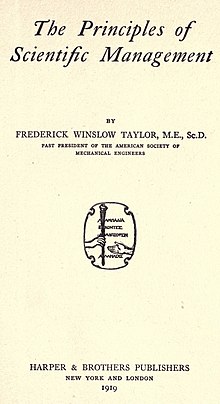This is a very influential book which formulates the principles of systematically, i.e. scientifically, making work (mainly manual) more productive. This, Taylor argues, is based on careful observation of tasks, experimentation with conceivably efficient means of performing those, and recording the results.
Taylor posits that such systematic, i.e. scientific, management can in most instances more than double the output per worker, and he cites several such successful initiatives.
In sum, this book is a very influential one, and constitutes a foundation for "Taylorism", both in good (evidence-based systematic efficiency improvement) and bad (viewing human beings more as machines than holistic, intelligent and social beings).
Was it good?
First of all, I believe that this is a book which is often cited and referred to, but actually rarely read - and this is one of the reasons I selected it for reading.
I'm a bit divided about the book. Of course, it is a classic, and is very laudable in proposing systematic (as opposed to convention-based or rule-of-thumb) means of developing work methods. On the other hand, Taylor's view of workers is not so laudable, as the following quote perhaps illustrates:
"After completing this series of experiments, therefore, each man's work for each day was translated into foot-pounds of energy, and to our surprise we found that there was no constant or uniform relation between the foot-pounds of energy which the man exerted during a day and the tiring effect of his work. On some kinds of work the man would be tired out when doing perhaps not more than one-eighth of a horse-power, while in others he would be tired to no greater extent by doing half a horse-power of work."
All in all, Taylor's overriding concern is to find methods to maximize "a day's work for a first-class workman", and not to develop a good overall workplace.
The main take-away for me?
This two-sidedness of the approach leads me to think, as the main take-away, that most lines of enquiry like this probably are misguided if taken to the extreme with no "balancing" considerations. Indeed, maximizing "a day's work" probably does not lead to long-term prosperity of either the employees or the employers -- long-term, that is.
Who should read the book?
Probably most management scholars and practicing managers should read this book in its original complete form in order to learn about what Taylor actually wrote instead of reading second- or third-hand accounts of "Taylorism".
The book on Project Gutenberg: The Principles of Scientific Management

No comments:
Post a Comment